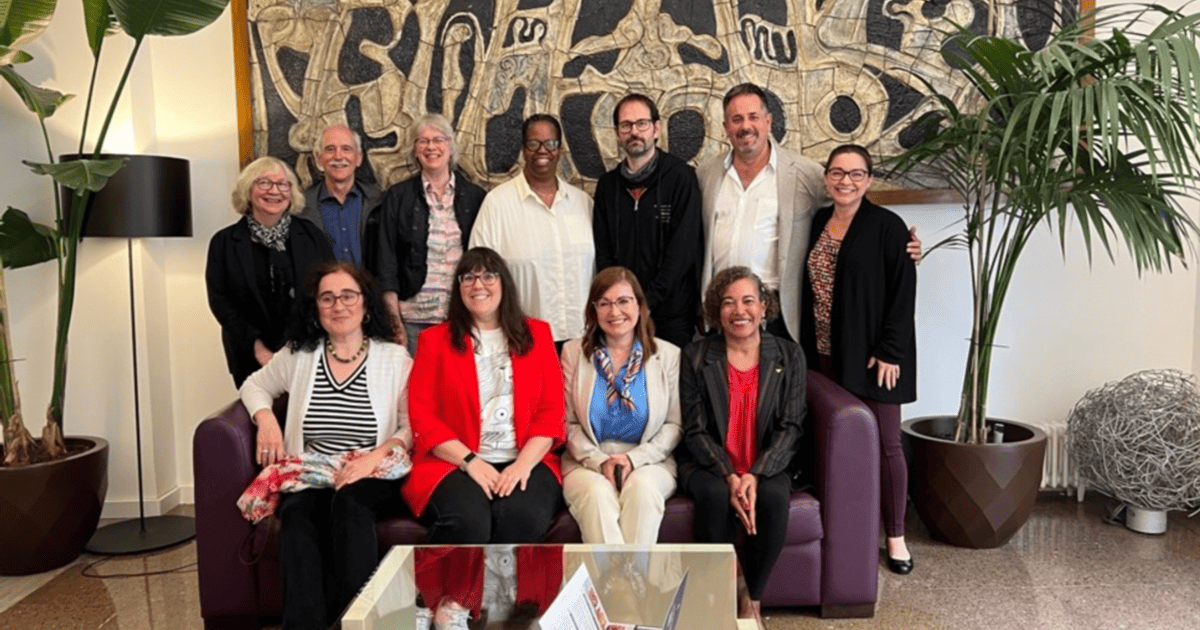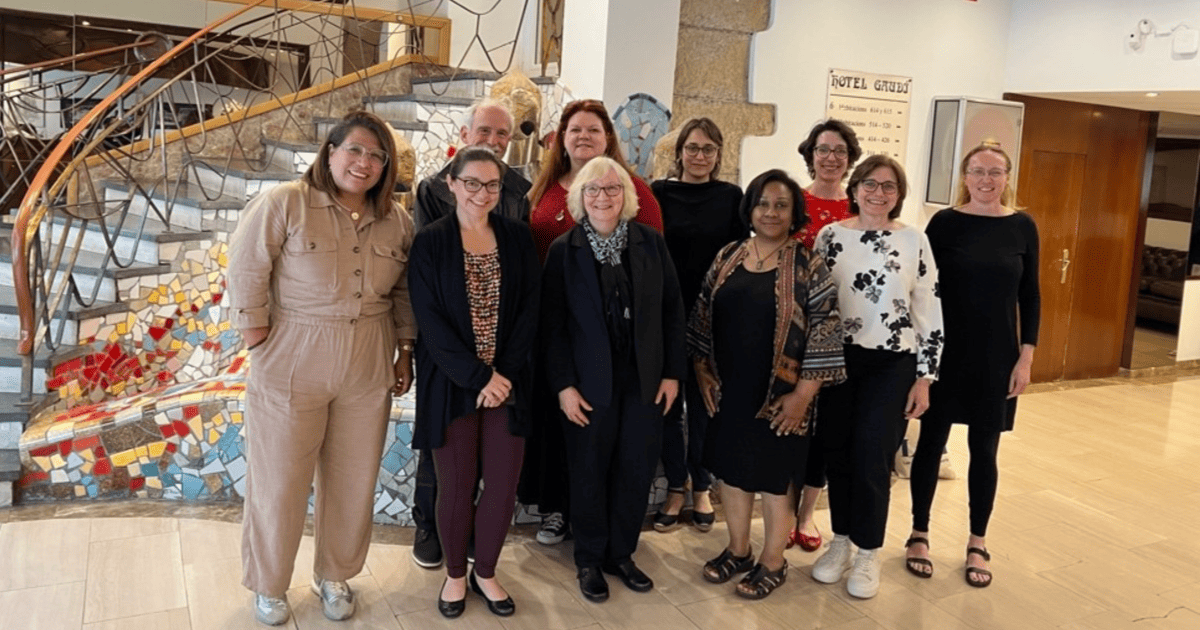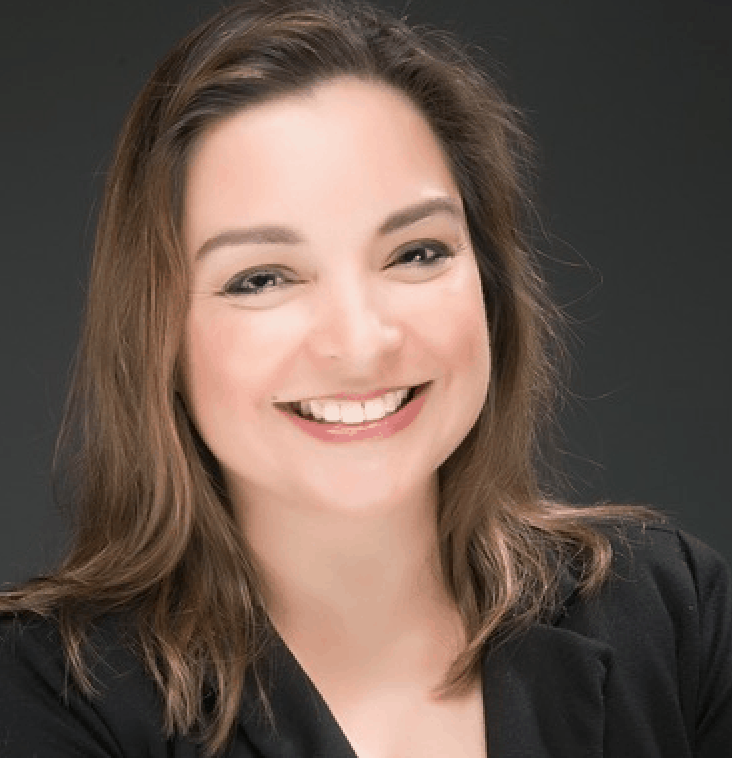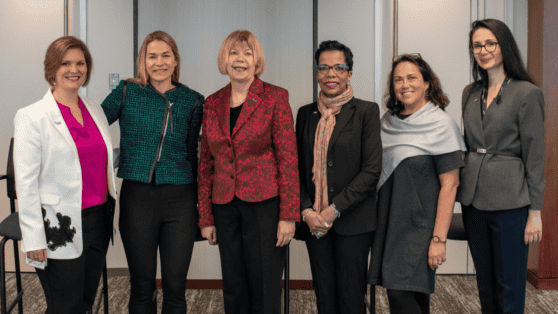Aligning with the 2023 WE Local Barcelona conference, members of the Society of Women Engineers (SWE) Research Advisory Council (RAC) met with researchers from various Spanish universities and research groups to discuss topics affecting women working and studying in STEM.
Given the expansive knowledge of those planning to attend, SWE hosted two separate discussions – one focused on STEM education and the other on the STEM workforce. The desired outcome from these discussions was to build relationships with researchers in Europe, with a particular focus on connecting researchers from the U.S., Spain, and SWE for potential collaboration on future research studies of mutual interest.
The morning of May 24th, we welcomed four RAC members and five Spanish researchers to a roundtable to discuss the challenges of recruiting women into STEM programs, promising policy and program interventions, and the importance of including boys and men in gender equity efforts in STEM.
We found that the Spanish researchers knew one another’s work, with some having collaborated on past research studies. We had a lively discussion that highlighted the barriers affecting women’s pursuit of STEM education in both the U.S. and in Spain, including poor messaging or understanding about the work and impact of engineers and scientists and the influence of gender stereotypes on children as early as elementary school.
The discussion also touched on issues facing people of color in STEM, with researchers noting the difference in the availability of racial and ethnicity data in Spain compared to the U.S. due to limitations affecting researchers’ ability to ask for such information on surveys.

Representing the SWE advisory council at the STEM Education roundtable discussion:
- Stephanie G. Adams, Ph.D., Dean, Erik Jonsson School of Engineering and Computer Science, The University of Texas at Dallas
- Karen J. Horton, P.E., Professor, Mechanical Engineering Technology, University of Maine
- Peter Meiksins, Ph.D., Professor Emeritus of Sociology at Cleveland State University, lead author of the annual SWE literature review
- Anne Perusek, Director of Editorial and Publications, Society of Women Engineers
- Roberta Rincon, Ph.D., Associate Director of Research, Society of Women Engineers
- Bevlee A. Watford, Ph.D., P.E., Professor, Engineering Education, Virginia Tech
Spanish researchers in attendance:
- David Fonseca Escudero, Ph.D., University Full Professor, La Salle, Ramon Llull University
- Alicia García-Holgado, Ph.D., Associate Professor, Computer Science Department, University of Salamanca
- Carina González, Ph.D., Full Professor, Department of Computer Engineering and Director of the Women Studies Research Institute, University of La Laguna
- Milagros Sáinz Ibáñez, Ph.D., Researcher, Internet Interdisciplinary Institute (IN3), Universitat Oberta de Catalunya
- Daniel Riera Terrén, Ph.D., Dean, Computing, Multimedia and Telecommunications, Universitat Oberta de Catalunya
In the afternoon, we welcomed researchers to a roundtable discussion centered on the research of women’s experiences in the STEM workforce. Discussion questions focused on policy interventions and societal and cultural gendered expectations.
Researchers noted the importance of having the STEM workforce reflect the diversity of the population that it serves to promote innovation and competitiveness. We also discussed the policy efforts implemented in the U.S. and Europe to encourage structural changes in the academic sector to achieve gender equality in research organizations.
Unlike the U.S., European initiatives have used funding mechanisms to hold academic institutions accountable, but efforts to hold private or publicly held organizations accountable is still a challenge in both regions.

Representing the SWE advisory council at the STEM Education roundtable discussion:
-
- Carlotta M. Arthur, Ph.D., Executive Director, Division of Behavioral and Social Sciences and Education at the National Academies of Sciences, Engineering, and Medicine
- Diane Foley, Senior Director, Information Technology, Raytheon Company
- Peter Meiksins, Ph.D., Professor Emeritus of Sociology at Cleveland State University, lead author of the annual SWE literature review
- Anne Perusek, Director of Editorial and Publications, Society of Women Engineers
- Roberta Rincon, Ph.D., Associate Director of Research, Society of Women Engineers
- Rishelle Wimmer, M.A., Senior Lecturer, Information Technology and Systems Management, Salzburg University of Applied Sciences
Spanish researchers in attendance:
- Núria Bayó Puxan, Ph.D., Director of Programmes, Barcelona Institute of Science and Technology (BIST)
- Rachel Palmén, Ph.D., Senior Researcher, Internet Interdisciplinary Institute (IN3), Universitat Oberta de Catalunya
- Lilia D. Tapia Mariscal, Assistant Professor Researcher, Department of Electronic Engineering and Computers, University of Córdoba and Ph.D. student in Agricultural, Food, Forestry, and Sustainable Rural Development Engineering
We were fortunate to have Ms. Bénédicte Losseau of Exempla Management Consulting sit in on our STEM workforce discussion. Ms. Losseau is working with SWE to strategically manage our growth in Europe. Her knowledge of and interest in SWE’s research activities will be helpful to our efforts to develop cross-continental research collaborations.
Several researchers who participated in our roundtable discussions are members of various research groups in Spain, including the Gender and ICT (GenTIC) and the Group of InterAction and e-Learning (GRIAL). The work of researchers from these organizations has been cited in SWE’s annual literature reviews over the years. We appreciated their involvement and interest in connecting with us and sharing their work.
The roundtable discussions that SWE has hosted since 2019 have been very enlightening, highlighting how the challenges facing our efforts to diversify the STEM professions are very similar in the U.S. and Europe. We intend to continue to engage with European researchers to better understand the unique societal and policy factors that affect diversity, equity, and inclusion in STEM and share findings with SWE’s global membership.
We look forward to sharing more details from our roundtable discussions in the next SWE Magazine State of Women in Engineering issue in March 2024. You can read about the roundtable discussions that we held with individuals in Germany in the 2023 SWE Magazine State of Women in Engineering issue here.
Author
-

Roberta Rincon oversees SWE's research activities on gender equity issues affecting girls and women in engineering, from school to career.





